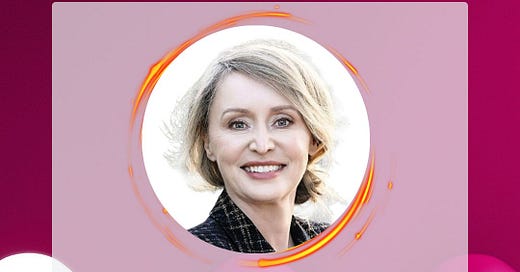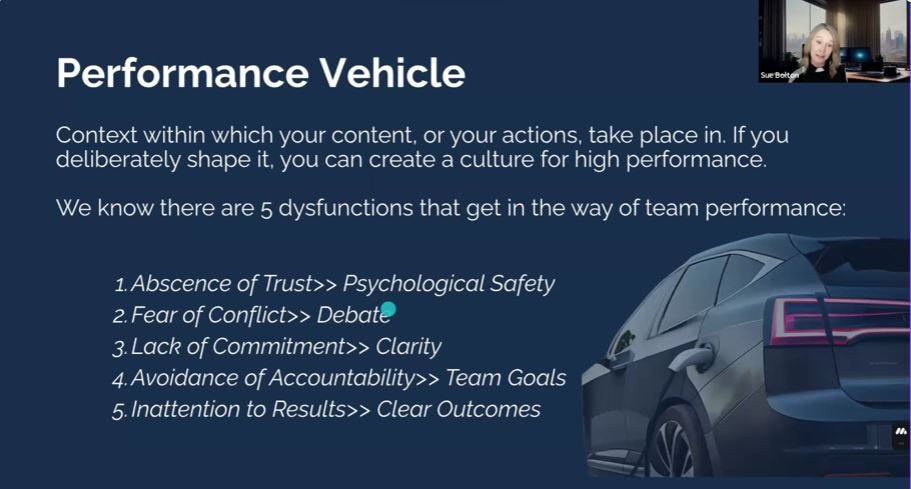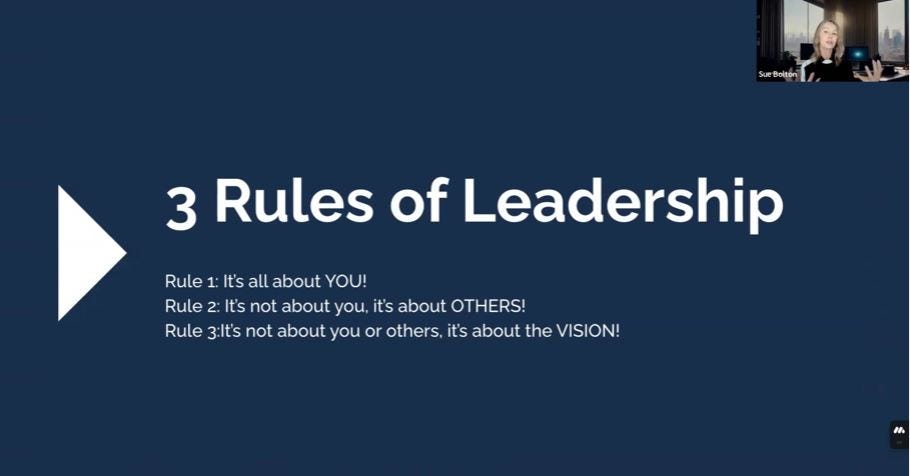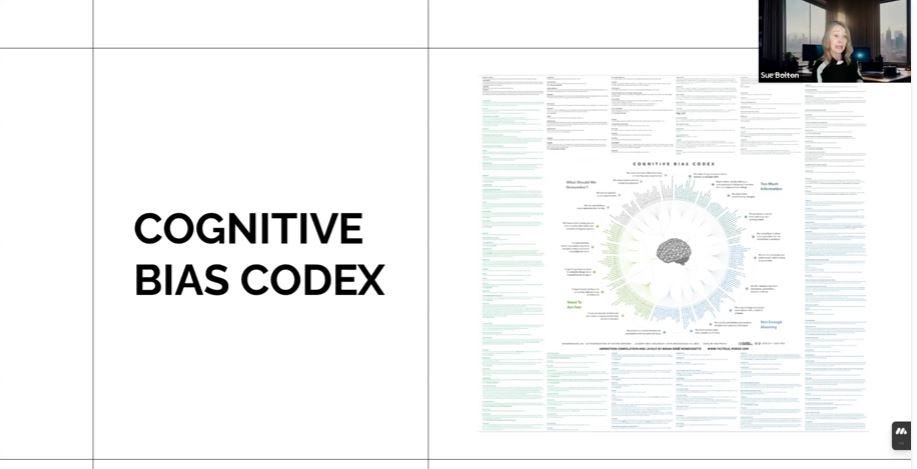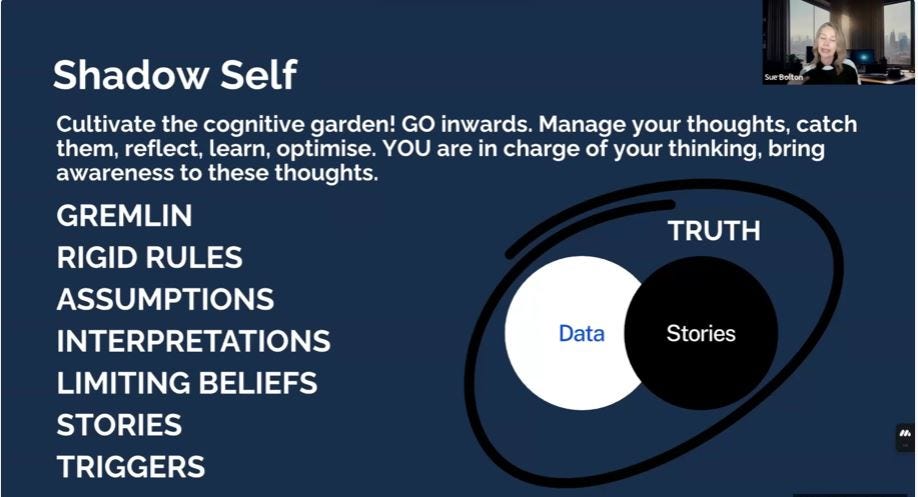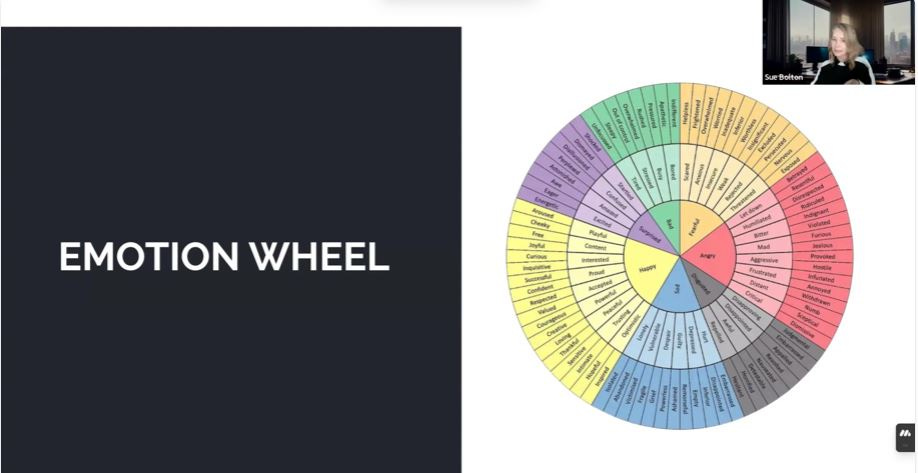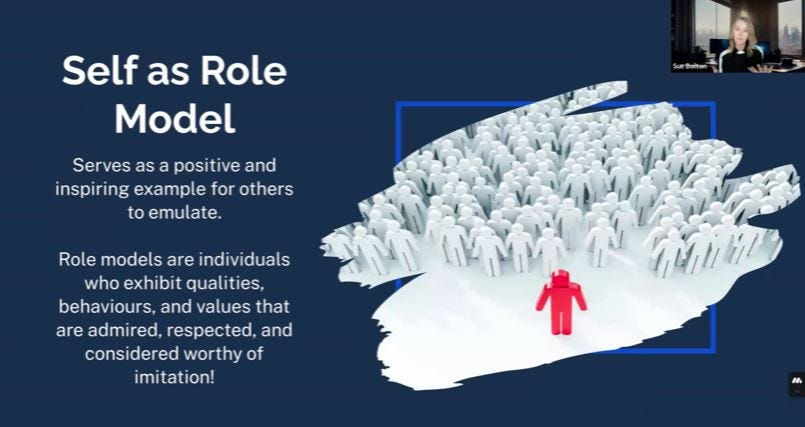💡Product Circle ⭕ Chat - Netflix to Now: Personal Growth, Leadership & Cultures of High-Performance with Sue Bolton
Product culture is your strategy in action and high performance is personal. At 💡Product Circle ⭕ Chat, Sue Bolton shows how Netflix empowers teams—and how you can too.
💡Product Circle⭕ Chat runs every second week as a Zoom call that anyone can join to talk all things product, product management and problem solving. Creating value for customers and the business.
Best of all, when you attend live, you receive goodies like free courses and decks (like Janna Bastow provided), a free book (like Rich Mironov, Roman Pichler and others provided), access to their course for free (like John Cutler provided) and many more.
Don’t forget to follow the 💡Product Circle ⭕ Chat calendar on Luma and register for our next talk on 💡 Product Circle ⭕ Chat - Commercialize: Turning Services Into Scalable Revenue with Eisha Tierney Armstrong on June 5
👋I’m Irene Liakos. A product management, change, AI and growth expert with over 2 decades of experience growing product profitably across Telco, Banking, Fintech, AI, Data, Travel, Ecommerce and more. I teach, coach and advise product managers and business leaders. Reach out to me if your products aren’t delivering the value you need. You can contact me at irene@phronesisadvisory.com
Now don’t miss an article, make sure you subscribe!
Let’s get back to Sue’s talk.
"An organisation is a series of conversations between people that can foster innovation. Culture is at the heart of the performance conversation." - Sue Bolton
This 💡Product Circle⭕ Chat was run on the 21 May 2025 at 12pm (AEST) with Sue Bolton.
Recording below👇🏼
But first a summary…
Sue Bolton gave us a Masterclass in intentially crafting a culture of high performance that starts with the internal self.
I guarantee, you’ll need to watch this more than once to capture all the wisdom she shares. She was so generous!
Not just about how Netflix creates high performing teams through a culture of transparent Vision & Strategy, Experimentation and Leadership - but about how you can master your inner gremlins and become an authentic leader and human being.
🎥What Makes Netflix’s Product Culture So Effective?
If you’ve ever wondered why Netflix is consistently ranked as one of the most innovative and effective product organisations in the world, the answer lies not in its tools or tech, but in its culture.
Last week on World Product Day, we welcomed Sue Bolton to Product Circle Chat. Sue is a former Netflix Product Leader and now a leadership coach working with teams across Australia. Sue shared her behind-the-scenes insights into what makes Netflix’s product culture high-performance and how product leaders can apply those lessons in their own organisations.
This session wasn’t just about what makes product teams high-performing. It was about how to intentionally design and nurture that culture from the inside out.
Below are the key takeaways from that session, packed with insights for anyone looking to create high-performing product teams.
🏅High-Performance is a Team Sport. But It’s Also Personal
We often think of high performance as the result of process excellence: good rituals, smart tools, clear OKRs. But as Sue explained, what sets truly high-performing teams apart is the mindset and behaviours of the people within them—especially their leaders.
Product culture isn’t something that happens in a slide deck. It’s how decisions are made, how people communicate, and how they show up for each other day-to-day. At Netflix, teams were expected to operate with a high degree of autonomy and accountability. That wasn’t just encouraged—it was expected.
But autonomy only works when there’s clarity—on outcomes, ownership, and trust. Leaders weren’t there to micromanage. They were there to create an environment where people could do their best work, with minimal friction and maximum context.
At Netflix, the foundation of high performance came from cultural clarity:
Clear ownership of outcomes
Distributed decision-making
A strong sense of accountability
Rather than relying on rigid approval structures, teams were trusted to make informed decisions and move quickly. This type of autonomy only works when there’s a shared understanding of expectations and a culture of mutual respect and responsibility.
Netflix’s product culture rests on five key principles. Each one is designed to scale clarity, reduce friction, and unlock trust across a global, fast-moving organisation.
1. Dream Team
Netflix is not a family—it’s a dream team.
This means the bar is high. Everyone is held accountable to a clear standard of excellence. When someone “slips,” they’re either side-bench[ed] or offered “physio or feedback” to get back on track.
The team is built around performance, integrity, and collaboration. It’s a system where everyone is striving to be their best—and helping each other get there.
"Dream team is very much around the idea that we're not a family. Netflix never touted themselves as a family. They touted themselves as a dream team who would hold each other to account to a certain standard of operating behaviour."
2. Freedom & Responsibility
“You always pick up the trash.”
At Netflix, people don’t wait for someone else to solve problems. Everyone acts like an owner. This isn’t about rewards or recognition—it’s about who you are.
“It’s about striving for excellence personally—not for promotion or bonus—but because that’s who you are.”
With more responsibility comes more freedom. That’s the trade Netflix bets on—and it works.
3. Decision-Making and Communication
At Netflix, decision rights don’t follow titles. They follow context.
“The structure is very flat… decision-making and communication go to the person with the most context.”
This flattens hierarchy and speeds up problem-solving. It also means individuals are trusted and empowered—so long as they have the context they need to make a good call.
4. Context is Everything
Memos are written early and shared widely. Feedback is added throughout the process to help shape thinking before a decision is made.
“I would never write a strategy in a room by myself and give it to my team. It would be debated heavily.”
This is how strategy gets better—and how people grow.
5. Informed Captains
When a decision needs to be made, the person with the most context becomes the informed captain. Not necessarily because of job title.
They gather perspectives, seek alignment (not consensus), and then make the final call.
“The captain asks who aligns, who doesn’t but can consent for the sake of the team, or who disagrees and why.”
This avoids the trap of endless collaboration with no decision. Instead, it drives momentum, ownership, and clarity. The “captain” changes based on the topic—e.g., the designer in design decisions, the engineer in tech ones.
“what we don't try to do at Netflix is work to to a hundred percent consensus.”
6. Highly Aligned, Loosely Coupled
Netflix avoids process-heavy coordination. Instead, they aim for tight alignment on strategy, but give teams freedom to choose their own tactics.
“Netflix did some research quite a long while ago, and found that heavy process is negatively correlated to innovation and creativity.”
Teams don’t follow rigid playbooks or scale frameworks like agile-at-scale. They self-organise and optimise for learning. Crucially, they also identify and address cross-team dependencies—which Sue notes are often “your limiter, your blocker.”
☕Feedback Is the Fuel
If there’s one system that underpins Netflix’s product culture, it’s feedback. Internally called “Farming for dissent”
Feedback wasn’t treated as a “nice to have” or a formal HR ritual—it was part of the daily fabric. At Netflix, people were expected to both give and receive feedback continuously, not because something went wrong, but because helping someone grow is a sign of respect.
"it's really, really important to give feedback feedback is the mechanism for exponential career growth, because you can only see yourself subjectively. You cannot see what others see. And so at Netflix we had something called farming for dissent. We constantly asked for feedback. We had a formal process once a year, where a platform opened up and you could give feedback up, across and down to anyone in the company."
Feedback isn’t a one-off process. It’s continuous.
It’s not about criticism, but about care and growth. Team members are expected to give, request, and act on feedback as part of everyday work.
Reed Hastings favourite book was “The Five Dysfunctions of a Team” by Patrick Lencioni.
For most teams, the challenge isn’t that they don’t value feedback. It’s that they fear it.
But feedback, when done well, builds psychological safety. It signals care, creates clarity, and strengthens trust.
Psychological safety. at Netflix, is built on two pillars:
Vulnerability-based trust (building real relationships and openness)
Operational-based trust (clear, quantified expectations and behaviors)
By making expectations explicit and encouraging open feedback, Netflix creates an environment where people feel safe to share real thoughts and opinions, driving both individual and team growth.
Sue encouraged product leaders to not just promote feedback but to model it. Ask for it regularly. Receive it graciously. And give it early, before frustration builds.
Over time, this creates a feedback loop that makes teams stronger and more resilient.
“If you want high performing teams, you've got to constantly grow as a person, as a leader, as an individual contributor.”
💡You Can’t Copy Culture, But You Can Translate It
One of the most valuable insights Sue shared is that culture cannot be copied and pasted. What works at Netflix may not work exactly the same in government, enterprise, or startups. But the principles can—and should—be adapted.
While the context may change, the human needs stay consistent. Teams want clarity, autonomy, and trust. They want to understand how their work connects to outcomes. And they want leaders who are consistent, transparent, and willing to learn alongside them.
Sue now works with teams in Australian organisations to translate principles of clarity, autonomy, and feedback into new contexts.
The key is being intentional: culture is something you design, not declare.
✨Inner Work Is Not Optional for Product Leaders
The most powerful shift in the conversation came when Sue turned our attention to personal leadership.
“There are over 3,300 cognitive biases and heuristics“
The inner work we do as product leaders—our ability to reflect, self-regulate, and respond with intention—is directly tied to how our teams function. Managing out “cognitive garden”.
Teams mirror their leaders.
When we’re reactive, unclear, or avoidant, it ripples.
When we’re grounded, curious, and present, it creates space for others to do the same.
GRAILS Framework
To help with this, Sue introduced her GRAILS Framework, designed to help leaders interrupt unhelpful patterns and shift into a more constructive mindset:
Gremlin
Rigid
Assumptions
Interpretations
Limiting Beliefs
Stories
Triggers (recently added)
GRAILS gives us a way to lead ourselves through uncertainty, conflict, and pressure, without getting stuck in frustration, avoidance, or fear.
It helps leaders move from auto-pilot into presence.
The framework resonated deeply with attendees, many of whom echoed the idea that leadership begins with self-awareness.
The Emotion Wheel
Sue introduced the Emotion Wheel as a practical tool for leaders to sharpen their emotional intelligence and respond more effectively. The wheel has three levels. The inner circle lists broad emotions—happy, sad, angry, fearful. Most of us stop here. But real growth comes from learning to operate from the third, outer ring, where more nuanced emotional states live. Instead of saying “I’m angry,” a leader might identify feeling “resentful” or “frustrated by inefficiency.” That precision gives you clarity on what’s really wrong—and what to do next.
Sue described how this deeper emotional awareness isn’t just for self-reflection—it’s a game-changer for teams. When you can label emotions with accuracy, you create space for others to feel seen and heard. For example, saying “It sounds like you feel discouraged” is much more empathetic than “You sound annoyed.” This kind of listening builds psychological safety, enhances communication, and lowers defensiveness. Sue also recommended a simple somatic check-in: notice where the emotion sits in your body, give it a shape, and name it. Suppressed emotions build tension; processed emotions make room for clarity and calm. By mastering this skill, leaders move from reactive to intentional—from good to great.
Integrity and Leaks
The discussion was so powerful deep. Sue took us on a journey to understand the 4 Levels of Integrity which are linked to effectiveness, influence and living an extraordinary life.
When we’re not experiencing the results we want in life, it’s always correlated to our level of integrity. As human beings we’re always out of integrity in some area of our lives and getting back into integrity requires contant practice.
Areas where you might be leaking integrity include:
Not keeping agreements or taking on someone else’s
Not taking responsibility (or taking on someone else’s responsibility)
Not speaking your truth, which means missing opportunities
Not feeling your feelings, which can lead to the body keeping score, holding tension and cuasing more conflict.
Bringing you integrity back in line is crucial for influencing others and powerful in your role as a leader, especially as a product manager who serves as a role model.
We talked about Leadership Shadows, Self as Influencer and how to influence others - which may be the most powerful slide out of a deck full of powerful slides.
There was so much value in the chat, the above summary doesn’t do it justice.
Knowing that high performing cultures starts with people and people are flawed, with our own shadow selves and gremlins. Being aware of them is the first step. Understanding this at scale, in your organisation of 100s or 1000s of people makes you realise the impact on the culture.
If we want teams that take ownership, give feedback, and grow together—we have to model it. We have to design for it. And we have to start with ourselves.
Great product leaders manage themselves. They bring clarity to chaos, presence to pressure, and possibility to problems.
And that starts within. We need to deal with our own shadows before we can influence or persuade others.
Watch the video to learn more 👇
Product Circle Chat 45 - Topic
Topic: Netflix to Now: Personal Growth, Leadership & Cultures of High-Performance
What makes Netflix’s product culture so unique?
How does it consistently deliver high performance and innovation at scale?
In this Chat, Sue Bolton, a former Netflix Product Leader, unpacks the product culture at Netflix through the lens of Marty Cagan’s product operating model. She explores how decision-making and communication flow beyond traditional org structures, and how strong feedback cultures create conditions where teams—and individuals—can thrive.
But high performance isn’t just systemic—it’s deeply personal.
Sue shared powerful reflections on the inner work required to lead well: how we show up as role models, partners, and influencers. She introduced her GRAILS framework—a tool to help you recognise and shift the mental patterns that hold you back.
We explored key questions like:
Why am I having this experience?
What is this moment teaching me?
Who am I being, and who do I need to become?
Whether you’re scaling a team, navigating a leadership shift, or simply hungry to grow, this session is for you.
🎯 Learn from one of Netflix’s former product leaders how to:
Build feedback-rich, high-performance cultures
Lead with greater awareness, authenticity, and impact
Apply lessons from Netflix to your team, product, and self
Product Circle Chat 45 - Video
Product Circle Chat 45 - Speaker
Sue Bolton is an accomplished product leader and coach with over two decades of experience across the U.S., U.K., and Australia. With deep expertise in product development, strategy, and personal transformation, Sue has worked with some of the world’s most renowned organizations, including Netflix, McGraw Hill Education, and Lionsgate, where she has tackled complex challenges at the intersection of technology, innovation, and customer outcomes.
At Netflix, Sue led a team of product & program managers to scale the localization of both the platform and content into 32 languages, enabling Netflix’s successful global expansion.
Now based in Sydney, Sue runs Transformative Visions, a product and leadership coaching business that develops exceptional product leaders who are deeply aligned with their values and deliver transformational business and customer outcomes.
Named one of Sydney’s Top 15 Coaches by Influence Digest, Sue also partners with the NSW Government, where her coaching has earned multiple Bravo Award nominations.
✨Sue’s Product Circle Chat: Netflix to Now slides
Links:
🔗 Sue Bolton on LinkedIn
📘 Be notified with Sue’s book is live
🎙️Subscribe to Transformative Visions on Substack
Product Circle Chat - Q&A
❓ How do I get involved?
1. Subscribe to the Product Circle Chat Calendar on Lu.ma and get notified of every 💡 Product Circle ⭕ Chat event
2.Register & Show up - Register to the Product Circle Chat event, block your calendar out and come to the next Chat 📅
3. Share - bring a friend or two who wants to talk all things Product 👯♂️👯♀️
4. Volunteer - volunteer to host or present at one of the future Product Circle Chats 🙋♀️. Drop me an email at irene@phronesisadvisory.com
❓ Will there be more sessions?
Yes. Fortnightly. Every second week.
❓ What if I can’t make the next session or don’t want to miss the next Product Circle chat invite?
Really want to come to the session but 😭 can't make this specific 💡 Product Circle ⭕ Chat?
📆 Get an invite directly into your inbox
👉 Subscribe to the Product Circle Chat Calendar on Lu.ma and get notified of every 💡 Product Circle ⭕ Chat event
💪 We've got you!
❓ Still have Questions?
Talk to me. Send me an email at irene@phronesisadvisory.com
Are you new to Product Management and want to learn from me?
I created a Course. For people new to Product Management.
Aligned it with the Learning Outcomes created by Product greats like Jeff Patton and others. Had it certified by the globally recognised ICAgile.
Choose to spend 2 days learning from me - either face to face or via Zoom - with ICAgile Certified Professional in Product Management (ICP-PDM).
And if you’re looking for a sneaky discount, send me an email at irene@phronesisadvisory.com

